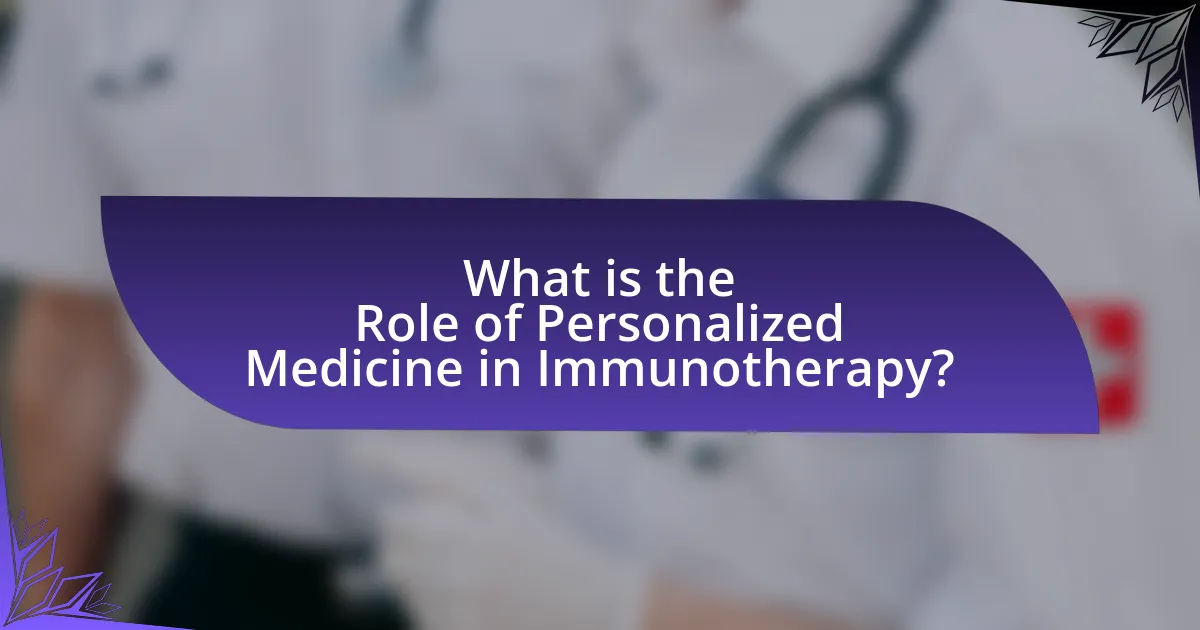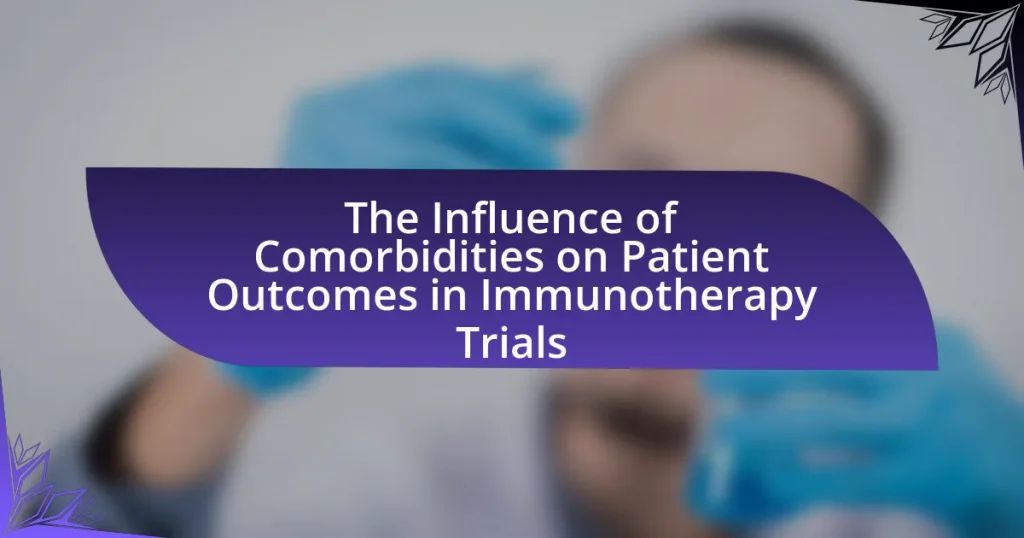Personalized medicine is a pivotal approach in enhancing the effectiveness of immunotherapy by customizing treatment strategies based on individual patient profiles, including genetic, biomarker, and phenotypic information. This article explores how personalized medicine improves patient outcomes by identifying specific biomarkers that predict responses to immunotherapy, thereby increasing survival rates and minimizing adverse effects. It also addresses the challenges in implementing personalized medicine, such as tumor heterogeneity and high costs, while highlighting the role of technology and multidisciplinary collaboration in advancing personalized treatment plans. Evidence from clinical studies underscores the significant benefits of tailored immunotherapy, emphasizing the importance of genetic profiling and continuous patient monitoring in optimizing treatment efficacy.

What is the Role of Personalized Medicine in Immunotherapy?
Personalized medicine plays a crucial role in immunotherapy by tailoring treatment strategies to individual patient profiles, which enhances therapeutic efficacy and minimizes adverse effects. This approach utilizes genetic, biomarker, and phenotypic information to identify the most suitable immunotherapeutic agents for specific cancer types or patient characteristics. For instance, the use of PD-L1 expression levels in tumors helps determine eligibility for checkpoint inhibitors, leading to improved response rates. Studies have shown that personalized approaches can significantly increase survival rates; for example, a study published in the Journal of Clinical Oncology demonstrated that patients receiving personalized immunotherapy based on tumor genomics had a 30% higher overall survival compared to those receiving standard treatments.
How does personalized medicine enhance immunotherapy effectiveness?
Personalized medicine enhances immunotherapy effectiveness by tailoring treatment strategies based on individual patient characteristics, such as genetic makeup and tumor biology. This approach allows for the identification of specific biomarkers that predict response to immunotherapy, leading to more targeted and effective interventions. For instance, studies have shown that patients with certain genetic mutations or specific tumor antigens respond better to particular immunotherapeutic agents, thereby improving overall treatment outcomes. By utilizing genomic profiling and other diagnostic tools, healthcare providers can optimize immunotherapy regimens, minimizing adverse effects and maximizing therapeutic efficacy.
What are the key principles of personalized medicine in this context?
The key principles of personalized medicine in the context of improving patient outcomes with immunotherapy include tailoring treatment based on individual genetic, environmental, and lifestyle factors. This approach allows for the selection of therapies that are most likely to be effective for specific patient profiles, enhancing efficacy and minimizing adverse effects. For instance, genomic profiling can identify biomarkers that predict response to immunotherapy, enabling clinicians to customize treatment plans. Studies have shown that patients receiving personalized immunotherapy based on such profiling experience better outcomes, as evidenced by research published in the Journal of Clinical Oncology, which highlights improved survival rates in patients with targeted therapies aligned to their genetic makeup.
How does genetic profiling contribute to personalized immunotherapy?
Genetic profiling enhances personalized immunotherapy by identifying specific genetic mutations and biomarkers in a patient’s tumor. This information allows clinicians to tailor immunotherapeutic approaches that target the unique characteristics of an individual’s cancer, improving treatment efficacy. For instance, studies have shown that patients with specific mutations, such as those in the PD-1 or CTLA-4 pathways, may respond better to certain immune checkpoint inhibitors. By utilizing genetic profiling, healthcare providers can select the most appropriate therapies, leading to improved patient outcomes and reduced adverse effects associated with ineffective treatments.
Why is personalized medicine important for patient outcomes?
Personalized medicine is important for patient outcomes because it tailors treatment strategies to individual genetic, environmental, and lifestyle factors, leading to more effective therapies. This approach enhances the precision of immunotherapy by identifying specific biomarkers that predict response to treatment, thereby improving efficacy and minimizing adverse effects. For instance, studies have shown that patients with specific genetic mutations respond better to targeted therapies, resulting in higher survival rates and improved quality of life.
What evidence supports the effectiveness of personalized approaches?
Personalized approaches in immunotherapy have demonstrated effectiveness through various studies showing improved patient outcomes. For instance, a study published in the Journal of Clinical Oncology by Hodi et al. (2010) found that patients with melanoma who received personalized treatment based on specific tumor characteristics had a significantly higher response rate to ipilimumab compared to standard treatment. Additionally, research by Miao et al. (2018) in Nature Communications indicated that tailoring immunotherapy based on genetic profiling led to enhanced survival rates in lung cancer patients. These findings underscore the positive impact of personalized medicine on treatment efficacy and patient survival in immunotherapy contexts.
How does personalized medicine reduce adverse effects in immunotherapy?
Personalized medicine reduces adverse effects in immunotherapy by tailoring treatments based on individual patient characteristics, such as genetic makeup and tumor biology. This approach allows for the selection of therapies that are more likely to be effective for specific patients while minimizing the risk of severe side effects. For instance, genetic testing can identify biomarkers that predict which patients will respond positively to certain immunotherapies, thereby avoiding ineffective treatments that could lead to unnecessary adverse reactions. Studies have shown that patients receiving personalized immunotherapy based on their genetic profiles experience fewer and less severe side effects compared to those receiving standard treatments.

What are the challenges in implementing personalized medicine in immunotherapy?
The challenges in implementing personalized medicine in immunotherapy include the complexity of tumor heterogeneity, the need for advanced biomarker identification, and the integration of genomic data into clinical practice. Tumor heterogeneity complicates the identification of effective treatment targets, as different cells within the same tumor may respond differently to therapies. Additionally, the identification of reliable biomarkers is essential for tailoring treatments, yet this process can be time-consuming and costly. Furthermore, integrating genomic data into clinical workflows requires significant infrastructure and training, which can be a barrier for many healthcare systems. These factors collectively hinder the widespread adoption of personalized medicine in immunotherapy.
What barriers exist in the integration of personalized medicine?
Barriers in the integration of personalized medicine include high costs, limited access to genetic testing, and regulatory challenges. High costs hinder patient access to personalized treatments, as many therapies are expensive and not covered by insurance. Limited access to genetic testing restricts the ability to tailor treatments based on individual genetic profiles, which is essential for effective personalized medicine. Regulatory challenges arise from the need for updated frameworks that can accommodate the rapid advancements in genetic research and technology, making it difficult for healthcare providers to implement personalized approaches effectively. These barriers collectively impede the widespread adoption of personalized medicine in clinical practice.
How do costs impact the accessibility of personalized treatments?
Costs significantly impact the accessibility of personalized treatments by limiting the availability of these therapies to patients who can afford them. High costs associated with personalized medicine, such as genetic testing and tailored therapies, often result in disparities in access, particularly for low-income populations. For instance, a study published in the Journal of Personalized Medicine found that the average cost of genetic testing can range from $300 to over $3,000, which can deter patients from seeking necessary treatments. Additionally, insurance coverage varies widely, with many plans not fully covering the expenses related to personalized therapies, further exacerbating accessibility issues.
What role do healthcare providers play in overcoming these challenges?
Healthcare providers play a crucial role in overcoming challenges associated with personalized medicine and immunotherapy by tailoring treatment plans to individual patient needs. They assess genetic, environmental, and lifestyle factors to determine the most effective immunotherapy options, thereby enhancing treatment efficacy and minimizing adverse effects. For instance, studies have shown that personalized approaches can lead to a 30% increase in treatment response rates compared to standard therapies. By actively engaging in continuous education and utilizing advanced diagnostic tools, healthcare providers ensure that patients receive the most appropriate and effective care, ultimately improving patient outcomes in the context of immunotherapy.
How can technology facilitate personalized medicine in immunotherapy?
Technology facilitates personalized medicine in immunotherapy by enabling the analysis of genetic, molecular, and clinical data to tailor treatments to individual patients. Advanced sequencing technologies, such as next-generation sequencing (NGS), allow for the identification of specific biomarkers associated with a patient’s tumor, which can inform the selection of targeted therapies. For instance, the use of bioinformatics tools helps in interpreting complex genomic data, leading to the development of personalized treatment plans that enhance efficacy and minimize adverse effects. Studies have shown that patients receiving personalized immunotherapy based on their unique tumor profiles experience improved outcomes, such as higher response rates and longer survival times, compared to those receiving standard treatments.
What advancements in data analytics are shaping personalized treatment plans?
Advancements in data analytics that are shaping personalized treatment plans include machine learning algorithms, real-time data integration, and predictive analytics. Machine learning algorithms analyze vast datasets to identify patterns in patient responses to treatments, enabling tailored therapies. Real-time data integration from electronic health records and wearable devices allows for continuous monitoring of patient health, facilitating timely adjustments to treatment plans. Predictive analytics utilizes historical data to forecast treatment outcomes, enhancing decision-making for personalized care. These advancements are supported by studies showing improved patient outcomes in immunotherapy when treatments are customized based on individual data profiles.
How do digital health tools support patient monitoring and engagement?
Digital health tools support patient monitoring and engagement by providing real-time data collection, personalized feedback, and enhanced communication between patients and healthcare providers. These tools, such as mobile health applications and wearable devices, enable continuous tracking of health metrics like vital signs and medication adherence, which empowers patients to take an active role in their health management. Research indicates that patients using digital health tools report higher levels of engagement and satisfaction, as these tools facilitate timely interventions and foster a collaborative healthcare environment. For instance, a study published in the Journal of Medical Internet Research found that patients utilizing digital health platforms experienced improved adherence to treatment protocols, leading to better health outcomes.

What are the future prospects of personalized medicine in immunotherapy?
The future prospects of personalized medicine in immunotherapy are highly promising, as advancements in genomics and biotechnology enable tailored treatment strategies for individual patients. Personalized medicine aims to optimize immunotherapy by identifying specific biomarkers that predict patient response, thereby enhancing efficacy and minimizing adverse effects. For instance, the use of genomic profiling in cancers like melanoma has led to the development of targeted therapies that significantly improve survival rates. Studies indicate that patients receiving personalized immunotherapy based on their unique genetic makeup show better outcomes compared to those on standard treatments. This trend is supported by ongoing research, such as the work published in “Nature Reviews Drug Discovery,” which highlights the potential of integrating artificial intelligence to analyze patient data for more precise treatment plans.
How might emerging research influence personalized treatment strategies?
Emerging research significantly influences personalized treatment strategies by providing insights into genetic, molecular, and environmental factors that affect individual responses to therapies. For instance, studies on biomarkers have identified specific genetic mutations that predict patient responses to immunotherapy, allowing for tailored treatment plans. Research published in “Nature Reviews Drug Discovery” highlights that understanding tumor microenvironments can lead to more effective immunotherapy combinations, enhancing patient outcomes. This evidence demonstrates that integrating findings from emerging research into clinical practice can optimize treatment efficacy and minimize adverse effects, ultimately improving patient care in immunotherapy.
What role do clinical trials play in advancing personalized immunotherapy?
Clinical trials are essential for advancing personalized immunotherapy by evaluating the safety and efficacy of tailored treatments for individual patients. These trials enable researchers to identify specific biomarkers that predict patient responses to immunotherapy, thus facilitating the development of targeted therapies. For instance, the use of biomarkers such as PD-L1 expression levels has been shown to correlate with the effectiveness of checkpoint inhibitors in various cancers, as demonstrated in studies published in journals like the Journal of Clinical Oncology. By systematically testing these personalized approaches in diverse patient populations, clinical trials provide critical data that inform treatment protocols and improve patient outcomes in immunotherapy.
How can collaboration between disciplines enhance patient outcomes?
Collaboration between disciplines enhances patient outcomes by integrating diverse expertise, leading to more comprehensive care. For instance, in personalized medicine and immunotherapy, oncologists, geneticists, and pharmacists work together to tailor treatment plans based on individual genetic profiles and tumor characteristics. This multidisciplinary approach has been shown to improve treatment efficacy; a study published in the Journal of Clinical Oncology found that patients receiving coordinated care from multiple specialists had a 20% higher response rate to immunotherapy compared to those receiving fragmented care. By leveraging the strengths of various fields, healthcare teams can address complex patient needs more effectively, ultimately resulting in better health outcomes.
What best practices should be followed for implementing personalized medicine in immunotherapy?
Best practices for implementing personalized medicine in immunotherapy include comprehensive genomic profiling, patient stratification based on biomarkers, and continuous monitoring of treatment responses. Comprehensive genomic profiling allows for the identification of specific mutations and alterations in a patient’s tumor, which can inform targeted therapies. Patient stratification based on biomarkers ensures that individuals receive therapies most likely to be effective for their specific cancer type and genetic makeup. Continuous monitoring of treatment responses through advanced imaging and biomarker analysis enables timely adjustments to therapy, optimizing patient outcomes. These practices are supported by studies demonstrating improved survival rates and response rates in patients receiving tailored immunotherapy approaches.
How can healthcare providers ensure effective communication with patients?
Healthcare providers can ensure effective communication with patients by actively listening, using clear language, and confirming understanding. Active listening allows providers to fully grasp patient concerns, while clear language avoids medical jargon that may confuse patients. Confirming understanding through teach-back methods, where patients repeat information back, ensures that the message has been accurately conveyed. Research indicates that effective communication can lead to improved patient satisfaction and adherence to treatment plans, ultimately enhancing health outcomes. For instance, a study published in the Journal of Patient Experience found that patients who felt heard and understood were more likely to follow medical advice and report better health outcomes.
What strategies can be employed to tailor treatment plans effectively?
To tailor treatment plans effectively, clinicians can employ strategies such as genetic profiling, biomarker testing, and patient-centered approaches. Genetic profiling allows for the identification of specific mutations that may influence treatment response, enabling the selection of targeted therapies. Biomarker testing helps in assessing the presence of specific proteins or genes associated with the disease, guiding the choice of immunotherapy that is most likely to be effective for the individual patient. Additionally, incorporating patient preferences and values into the treatment decision-making process enhances adherence and satisfaction, ultimately improving outcomes. Research has shown that personalized treatment plans based on these strategies can lead to better responses and reduced adverse effects, as evidenced by studies demonstrating improved survival rates in patients receiving tailored immunotherapy based on genetic and biomarker information.



